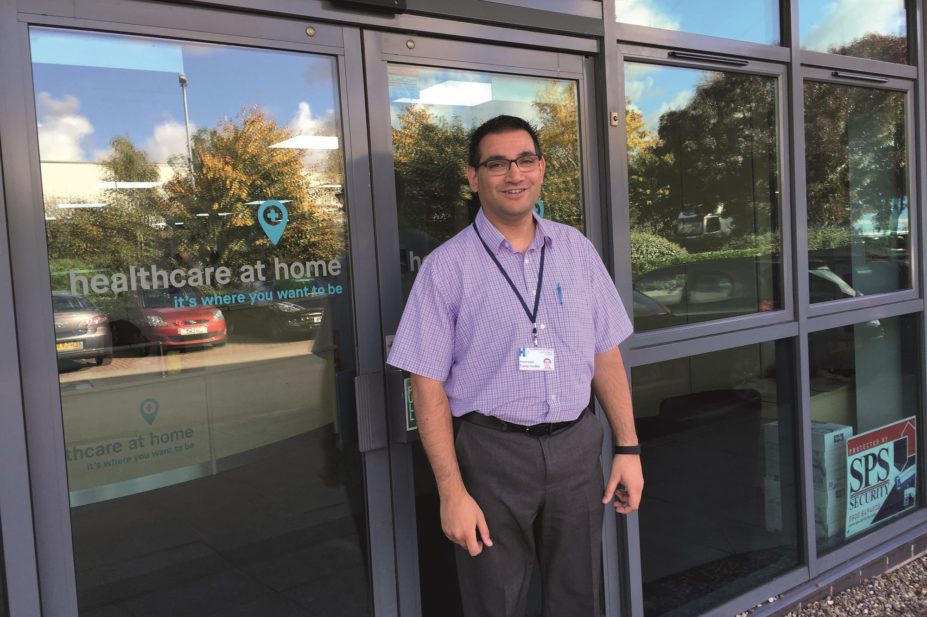
Tariq Atchia
Tariq Atchia began working for Healthcare at Home in 2015 following preregistration training in hospital, four years working in community pharmacy and then three years with another clinical homecare provider. He explains what the role involves and why specialist communication skills are required for it.
Why did you decide to take on a role at Healthcare at Home?
I was initially attracted to homecare because it bridges the gap between hospital pharmacy, where I did my preregistration training, and community pharmacy, where I worked post-registration. My current job at Healthcare at Home is the second time that I have worked for a clinical homecare provider, having worked for a competitor previously. There are a number of such providers across the country — Healthcare at Home, established in 1992, is the largest and oldest.
Clinical homecare is the provision of secondary care patient treatment in patients’ own homes – whether that is the home delivery of refrigerated recombinant Factor VIII for haemophilia patients, expensive oral oncology and HIV antiviral medicines, or even complex weekly or fortnightly home infusions of enzyme replacement therapy for patients with rare lysosomal storage disorders such as Fabry Disease. We have our own refrigerated delivery network and a team of nurses across the country that can conduct administration training or routine infusions in patients’ homes.
What are your responsibilities?
Our team of pharmacists is responsible for legal and clinical approval of incoming prescriptions from hospital trusts, counselling patients by telephone about their medicines and responding to queries from patients and customer healthcare professionals about the medicines we dispense, as well as supervising the dispensary as the responsible pharmacist on duty.
Our dispensary is entirely technician led — just as a hospital pharmacy would be — with accuracy checking routinely carried out by accredited checking technicians and second checks for high-risk medicines such as chemotherapy conducted by specialist oncology pharmacists. We also engage with other teams around the business — for example, members of our customer services team who arrange deliveries with patients. We always have a pharmacist based within the inbound customer services team providing oversight, training and quick interventions to improve our contact with patients.
What do you find most fulfilling about your work?
One might think that a pharmacy specialising in home delivery of medicines offers limited opportunities for patient contact. In fact, quite the opposite is true. The job stretches your communication skills — imagine talking a patient through how to use a prefilled injection pen device over the phone without the benefit of just being able to show them.
I have developed specialist knowledge in the range of drugs that we supply — a core range of around 50 medicines that we dispense in high volumes to patients in hundreds of different hospital trusts across the country. I find it enjoyable to give patients advice over the phone and it is rewarding to hear their appreciation. They value our accessibility when they may have had difficulty getting through to their hospital clinic or they just did not know who to call.
What is the strangest thing that has happened to you while you were working in your current role?
Among the oddest patient queries that I have been faced with was “my dog has eaten my injection pen”. Although it had been chewed beyond use, fortunately the animal was not harmed and we managed to get a replacement to the patient in time for their next dose. We also provide advice for patients who have left their medicines out of the fridge accidentally and help patients plan for exotic and sometimes lengthy holidays to ensure their medicines stay cold enough for the duration of their journey.
If you could make one change to make your role easier, what would it be?
The advent of new technologies will make our job much easier. With the proliferation of smartphones, I foresee patient contact and counselling by video call in the near future using programmes such as Skype or FaceTime.
Many of the prescriptions we receive are hospital outpatient prescriptions that we dispense privately and invoice the hospital for. This generates a massive paper chain and subsequent archiving of paperwork. A robust, efficient and legally recognised method of electronic private prescribing across organisational boundaries would be the single biggest improvement that could be made to the whole clinical homecare industry — and it would have massive benefits for our hospital customers, too, by reducing the amount of physical paperwork.
What tips would you give a preregistration trainee hoping to pursue a career in your role?
Hospital preregistration experience provides a great grounding because it is important to understand how hospital pharmacy works — it is our key interface. However, you should not be put off homecare if you have no hospital experience. Homecare is equally open to pharmacists with community experience. Services that can be provided by telephone, such as the new medicine service, give opportunities to practise your telephone patient counselling skills. I would recommend getting at least one or two years of experience in either sector and also looking at the websites of the various UK clinical homecare providers — a full list can be found on the website of our trade association, the National Clinical Homecare Association.
You may also be interested in

Patient organisations call for simplified e-prescribing in homecare medicines services

Updated RPS professional standards aimed to ensure high-quality homecare services across the UK
